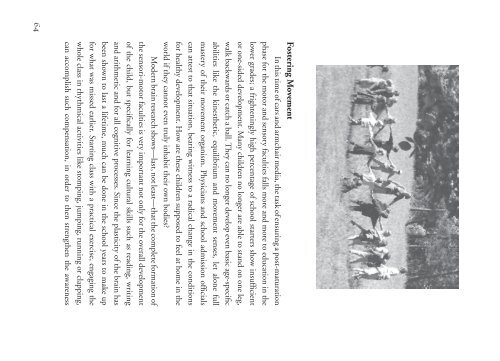Developmental Signatures - Waldorf Research Institute
Developmental Signatures - Waldorf Research Institute
Developmental Signatures - Waldorf Research Institute
Create successful ePaper yourself
Turn your PDF publications into a flip-book with our unique Google optimized e-Paper software.
Fostering Movement<br />
In this time of cars and armchair media, the task of ensuring a post-maturation<br />
phase for the motor and sensory faculties falls more and more to education in the<br />
lower grades; a frighteningly high percentage of school starters show insufficient<br />
or one-sided development. Many children no longer are able to stand on one leg,<br />
walk backwards or catch a ball. They can no longer develop even basic age-specific<br />
abilities like the kinesthetic, equilibrium and movement senses, let alone full<br />
mastery of their movement organism. Physicians and school admission officials<br />
can attest to that situation, bearing witness to a radical change in the conditions<br />
for healthy development. How are these children supposed to feel at home in the<br />
world if they cannot even truly inhabit their own bodies?<br />
Modern brain research shows—last, not least—that the complete formation of<br />
the sensori-motor faculties is very important not only for the overall development<br />
of the child, but specifically for learning cultural skills such as reading, writing<br />
and arithmetic and for all cognitive processes. Since the plasticity of the brain has<br />
been shown to last a lifetime, much can be done in the school years to make up<br />
for what was missed earlier. Starting class with a practical exercise, engaging the<br />
whole class in rhythmical activities like stomping, jumping, running or clapping,<br />
can accomplish such compensation, in order to then strengthen the awareness
















